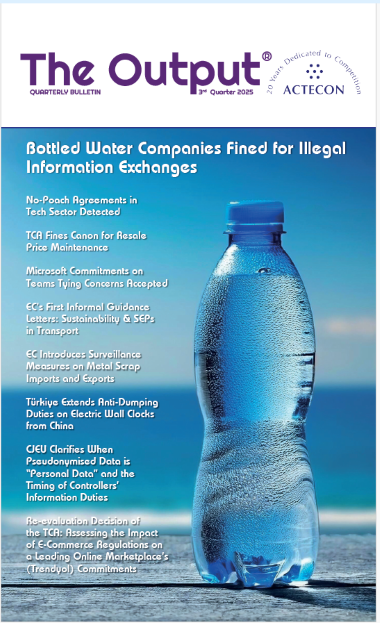The TCA Imposes Fine on Doğa Koleji for Its Anti-Competitive Conducts in the Labour Market
| Competition Law

Article By Can Sarıçiçek, Özlem Başıböyük Coşkun, Zeynep Özgültekin and Nadide Akdağ
The Turkish Competition Authority (“TCA”) concluded its investigation into Arı İnovasyon ve Bilim Eğitim Hizmetleri AŞ (“Doğa Koleji”) regarding the claims that Doğa Koleji has engaged in anti-competitive practices with other private schools operating in the Kocaeli province, with its decision dated 03.10.2024 and numbered 24-40/948-407 (“Decision”).
Doğa Koleji was alleged to have participated in collusive conduct with competing private schools, jointly determining the level of annual meal fees charged to students and restricting competition in the labour market for teaching personnel. These practices allegedly involved exchanging sensitive information about wages and job applicants, making joint hiring or no-hiring decisions, and collectively implementing wage restraint policies. Such conduct was claimed to restrict competition in terms of both service pricing and employment conditions, potentially leading to higher prices for customers and reduced job mobility for educators.
Background of the Decision
The case originated from a preliminary inquiry initiated by the TCA on 23.11.2022, based on the claim that private schools operating in the province of Kocaeli, in coordination with the Kocaeli Chamber of Commerce, had jointly determined educational and meal service fees. Following the on-site inspections conducted, the TCA launched an investigation into five schools1 and subsequently conducted further inspections at the premises of additional 14 private schools as part of the same case. Ultimately the TCA decided to initiate a new investigation and consolidate it with the ongoing proceedings.
During the investigation, most of the parties applied for settlement under the Regulation on the Settlement Procedure Applicable in Investigations on Agreements, Concerted Practices and Decisions Restricting Competition and Abuses of Dominant Position (“Regulation on the Settlement Procedure”). The TCA accepted these requests and concluded the investigation through settlement decisions for all parties except for Doğa Koleji, whose case proceeded through standard investigation proceedings.
A Closer Look at the Alleged Behaviours
Collusion on Meal Prices
Firstly, it was alleged that Doğa Koleji, along with several other private schools operating in Kocaeli, jointly determined the prices of meal services offered to students. The TCA assessed the findings obtained during the investigation, which indicated that certain private schools had engaged in coordinated conduct through various channels, including internal memoranda, WhatsApp group messages, and standardized communication templates sent to parents3 . These documents were deemed to support the existence of an agreement among competing schools to raise meal prices collectively. However, with respect to Doğa Koleji, the TCA found no direct or indirect evidence – such as communications, meeting records, or internal documents – indicating that the school had participated in the coordinated conduct. Accordingly, the TCA determined that Doğa Koleji was not involved in the collusion regarding meal pricing and decided that there was no basis for imposing an administrative fine in this respect4.
Wage-fixing and No-poaching Agreements
It was also alleged that Doğa Koleji engaged in anti-competitive practices in the labour market, such as fixing wages and entering into no-poaching agreements with other private schools operating in Kocaeli. As emphasized by the TCA, labour costs constitute a significant input in service sectors (such as education), and agreements among competing employers to fix wages or restrict employee mobility distort competition in the input (labour) market5 .The TCA highlighted that such conduct, whether in the form of explicit wage agreements, mutual non-solicitation pacts, or the exchange of sensitive information, can have anti-competitive effects similar to those typically observed in traditional product market cartels. These effects include, suppressed salaries and reduced labour market dynamism6 . The investigation primarily focused on communications within a WhatsApp group, where various school administrators exchanged information on individual teachers, discouraging the recruitment of certain candidates i.e. employees who had breached contracts, and discussed aligning salary adjustments with public sector wage increases. The TCA noted that these exchanges were based on a common understanding not to recruit each other’s staff, thereby limiting labour mobility within the sector. It is further concluded that the agreement was evaluated among the parties and deemed effective in achieving its purpose7.
Although Doğa Koleji’s name did not appear in any specific messages within these conversations, it was established that the school’s representatives participated in the WhatsApp group throughout the relevant period. Based on this, the TCA concluded that a undertaking’s mere presence in a forum where anti-competitive coordination is taking place may render that undertaking liable, unless it actively distances itself from the conduct, by objecting to or disassociating from the discussions. The TCA found that Doğa Koleji failed to clearly object to the conversations or convey its non-participation to other group members, thereby contributing to the shared understanding of alignment with the conduct8.
In its defence, Doğa Koleji argued that the investigation notice did not include any documents directly referencing the school directly, nor was the school identified as a party to any relevant communication. The school also claimed that it did not attend the Kocaeli Chamber of Commerce meeting on 2 August 2022 and denied entering into any agreement or engaging in any coordinated practice with its competitors9 . Nonetheless, the TCA rejected these arguments, emphasizing that, under competition law, mere silence in the face of anti-competitive discussions may give rise to liability when an undertaking fails to clearly distance itself from the collusive environment10 . Although no direct messages from Doğa Koleji representatives were found within the WhatsApp group, the TCA underlined that undertakings participating in a forum where anti-competitive coordination takes place must expressly oppose the discussions or outcomes, if they do not wish to be considered part of the infringement. Failing to do so creates the perception among other participants that the undertaking will align with and act in accordance with the agreed-upon practices11 . The TCA also found that Doğa Koleji’s representatives in the WhatsApp group, where competitively sensitive information such as salary arrangements and employment decisions was exchanged, had become party to an anti-competitive agreement that restricted competition in the labour market. It was also noted that the legal assessment of such conduct does not depend on an individual’s title; rather it depends on whether they have any decision-making power within their organization12 . Rather, the decisive factor is whether they gained access to rivals’ strategic information, which is presumed to influence an undertaking’s commercial decisions, regardless of internal roles or titles. Based on this, the TCA concluded that Doğa Koleji had participated in a horizontal agreement aimed at limiting competition in the labour market. Following its assessment, the TCA imposed an administrative fine of TRY 591,347.22 (approx. EUR 13,663.30)13 on Doğa Koleji for engaging in anti-competitive practices intended to suppress wages and restrict employee mobility.
Conclusion
While there was insufficient evidence to establish Doğa Koleji’s involvement in the alleged coordination concerning the determination of meal fees; the TCA concluded that the undertaking had engaged in anti-competitive conduct in the labour market. Specifically, Doğa Koleji was found to have infringed competition law, by participating in a communication platform where competing schools discussed wage-fixing and no-poaching strategies, and by failing to disassociate itself from these exchanges. Despite Doğa Koleji’s argument that there was no direct evidence implicating it in the infringing practices, and that it had not attended the key coordination meetings, the TCA emphasized the importance of undertakings distancing themselves from collusive environments in order to avoid being perceived as participants. On these grounds, the TCA imposed an administrative monetary fine on Doğa Koleji for its involvement in restricting competition in the labour market for educational personnel.
1The TCA’s decision dated 28.04.2023 and numbered 23-19/374-M.
2The TCA’s decision dated 23.11.2023 and numbered 23-54/1061-M.
3The Decision, paras. 45-48.
4The Decision, para. 88.
5The Decision, para. 63.
6The Decision, para. 66, 70.7The Decision, para. 89.
8The Decision, para. 104.
9The Decision, para.103.
10The Decision, para. 104.
11The Decision, para. 104.
12The Decision, para. 109.




